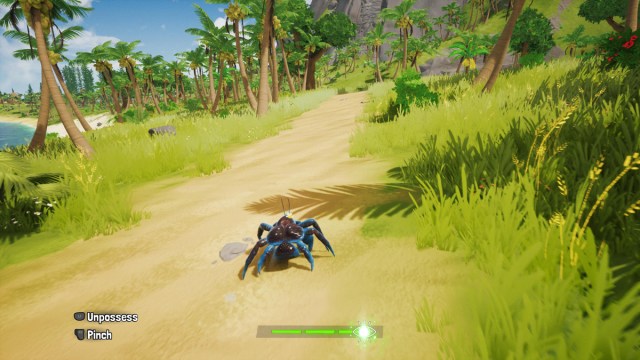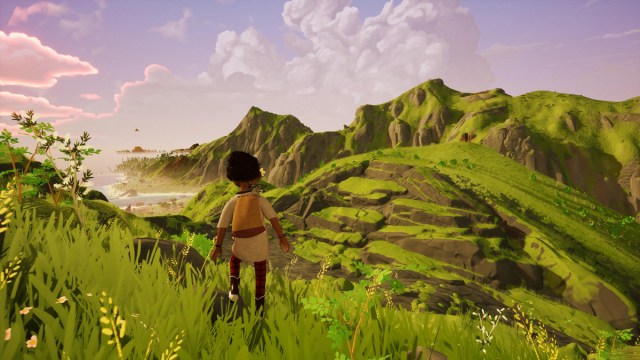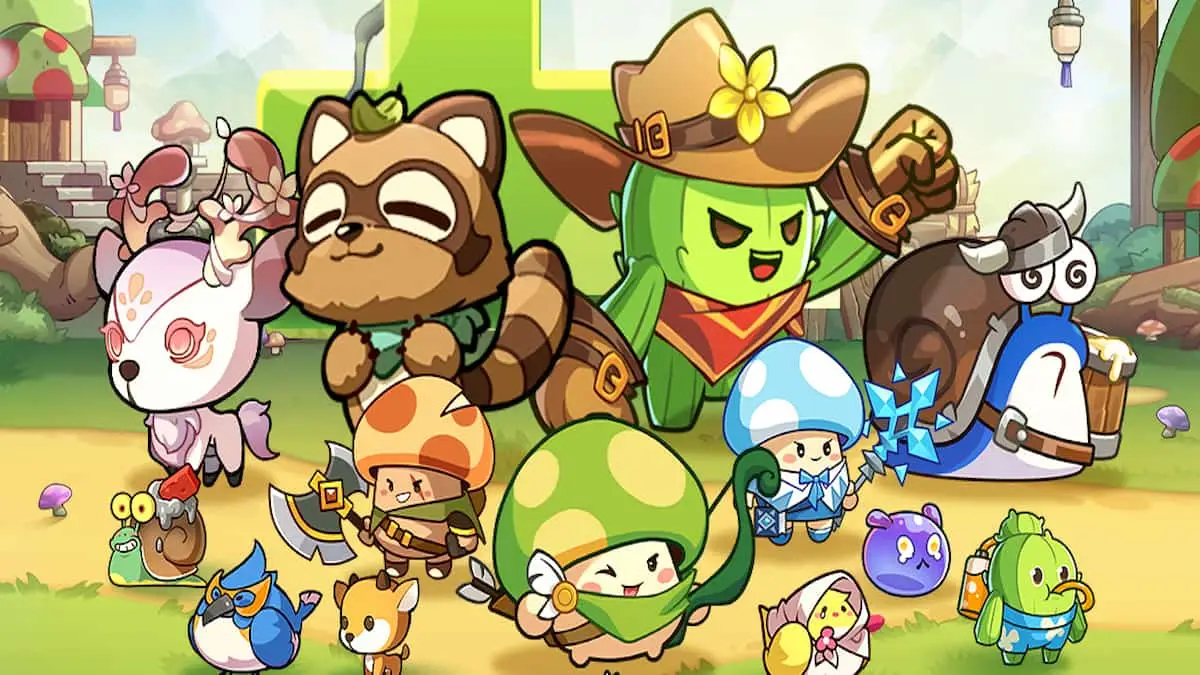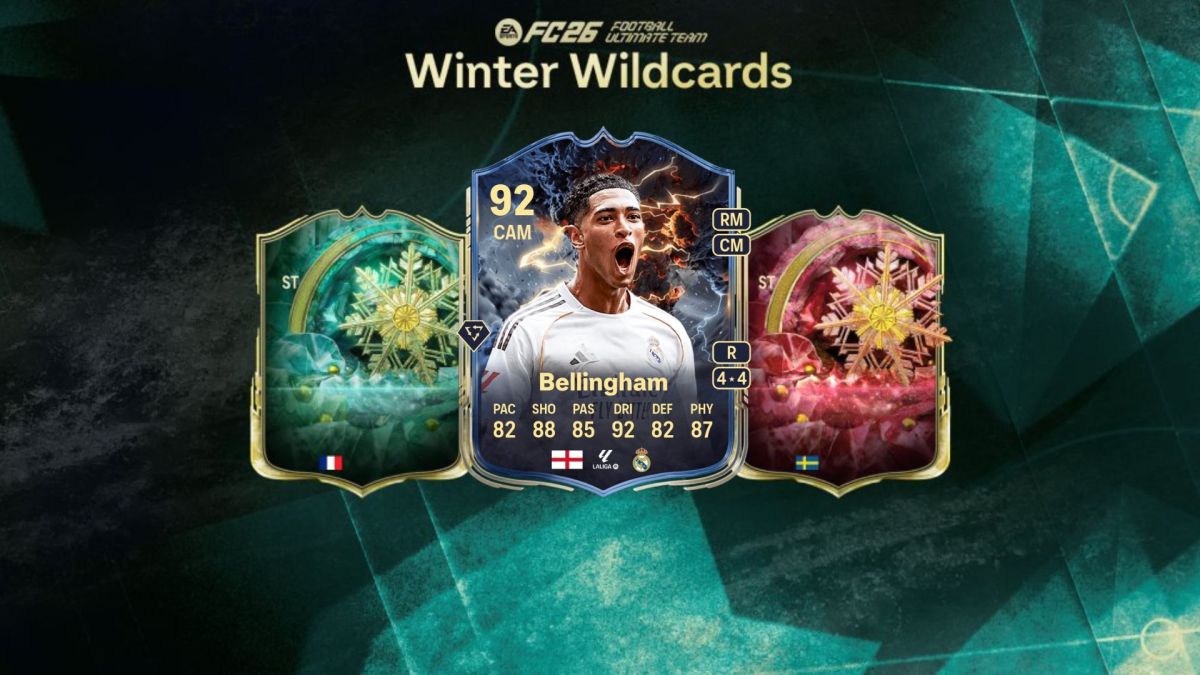The game that grows
I misguidedly came into Tchia thinking it would be a lighthearted jaunt, something along the lines of Lil’ Gator Game or Alba: A Wildlife Adventure. To be fair, everything about this game screams “summer vacation”. The island setting is marvelous and bright, the exact kind of setting I could use right now, having been trapped in a perpetual winter for the last three months. Its eponymous hero is the type of laid-back person I strive to be on holiday, eating delicious-looking food while chilling by the campfire with her ukulele in hand. That, to me, sounds like the perfect island getaway…
…but this journey would be no trip to Sandals.

Tchia (PC, PS4, PS5 [reviewed])
Developer: Awaceb
Publisher: Kepler Interactive
Released: March 21, 2023
MSRP: $29.99
Tchia is on a quest to get her father back. Her idyllic island life was torn asunder with the arrival of an old acquaintance. Accompanied by two fabric soldiers, the three of them take Tchia’s dad to Meavora, a malevolent king who rules over this tiny archipelago. Meavora is about as evil of a villain as I’ve seen in quite some time. The monarch’s introduction to the player was so dark and demented, that I couldn’t wait to start kicking their ass. But that would have to wait until I could expand Tchia’s powers. That, and complete the story, as Tchia’s quest is largely tied to the narrative.
Our her has a few tools at her disposal, including a slingshot, a camera, and a flashlight, but the top weapon in Tchia’s arsenal is her “Soul Jumping” ability. With this, she can jump into any animal in the game and dozens of different objects. As you explore the world, Soul Jumping into a bird, dog, or even a rock will help Tchia travel faster than she can on foot. When in battle against Maano, the fabric soldiers mentioned earlier, she can possess gas cans and oil lamps that burn those mother truckers to ashes.
Yes, there is combat in Tchia, and in the beginning, it’s highly enjoyable. The first time I stumbled across a Maano Camp was when I realized there was more to this game than the fetch quests I was doing up until that point. I really had to be on my toes here, and taking possession of the various flammable objects at the camp and hurling them at my enemies provided the type of rush I didn’t think this game would provide. It was an absolute hoot the first few times I took them down, but like several elements in Tchia, it does tend to get drawn out a bit.
Maybe it’s padding the game time or maybe I was just going through the game a bit too fast, but some of the combat sections of Tchia do last a bit longer than I would have liked. The issue is, as much fun as I have with the combat, it doesn’t change. You’ll approach every Maano settlement the same way: grabbing explosives, taking control of them, and then lobbing them at your enemies. There are ways to change it up, like setting fire to a bigger object and throwing that at your enemies, but it’s more or less the same thing. Beyond the camps you’ll come across on your journey, there are four large industrial zones that play out like an all-out assault and four is probably one too many.
Now, the best way to avoid the feeling of monotony that I found is to actually explore these islands. The archipelago consists of two large islands where you’ll spend the majority of your time, but there are plenty of goodies to be found at sea. I adore the sailing mechanics in Tchia. You don’t just sit in one place and do everything. You actually have to move around the vessel to control the sail, steer and drop anchor. I didn’t do as much sailing as I thought I would in the game, but every time Tchia stepped foot on that boat, I could feel the same rush I got setting out in The Legend of Zelda: The Wind Waker.
Most of my traversal around this world was on foot and through Soul Jumping into birds and other creatures where I could. Rocks are plenty in this world if you just want to get around fast, but I was a bit disappointed with how sparse the wildlife could be in those moments when I had to travel high up over a mountain. Many times, I just couldn’t find a bird if my life depended on it. Tchia can climb on every surface with ease, though you’ll often come across an impossibly steep hillside that you’re able to slowly walk up rather than climb, which does point to the world not being as carefully designed as it could have been. But it’s negligible considering a lot of thought and care was put into the other ways Tchia can travel, including her super-useful slide skill and her ability to slingshot herself out of trees. Those are great traversal techniques when you just don’t have a bird or a bug around.

And you will want to explore as many of these islands as you can because there is so much to see. While the main narrative doesn’t do nearly a good enough job of taking you around the world—there’s an entire city I was basically able to ignore until the post-game—you are greatly rewarded for seeing as much as you can. Not only can you unlock new styles and accessories for Tchia and her boat, but you can also unlock new songs for her ukulele and discover challenge temples that’ll give you more time when you Soul Jump.
Unfortunately, finding every little point of interest in this game can be difficult. Because nothing in this world is exaggerated in design, everything blends into the environment with ease. That wouldn’t be a problem if some of the activities you need to find, like the rock-stacking mini-game that unlocks new ukulele songs, are so damn small you really have to be on the lookout for them. These points do glow with lensflare, but even that is small enough to miss. I appreciate how organic the world looks, but I wish the developers would have implemented something extra to help guide players toward these necessary points of interest.
I guess I shouldn’t be complaining too much about being given a reason to stay in this world for longer periods of time because it really is a special place to be. The developers made great use of Unreal Engine 4, creating a gorgeous world to explore whether you’re on land or under the sea. If there is one space where Tchia outdoes its main source of inspiration, The Legend of Zelda: Breath of the Wild, it’s with its reef-filled ocean that’s beckoned me to dive deep. These underwater habitats are a joy to explore while Soul Jumping as a fish, so much so that I spent far more time underwater than the game asked of me.

It’s the details in these reefs that make them so appealing; so worth your time. In fact, there are so many small details and little touches throughout the world that it’s hard for me to say which touch of “above and beyond” is my favorite. If I were to force myself to choose one for this review, it would be when you cycle through the chords on Tchia’s ukulele, you see her hands doing the proper fingering for the chord. Of course, that can be easy to miss when you’re in the middle of some of these little-too-long jam sessions, but the game does allow players to sit back and let Tchia do the work in these sections for them. That was the preferable way to go through them as it allowed me to read the lyrics along with the music. And if you’re wondering, the music is phenomenal throughout. Enough so that I’m waiting for Mondo or Fangamer to announce a vinyl of the OST. I will buy that day one if it ever becomes a reality.
Tchia might very well be the most ambitious indie game we see in 2023. This open-air and open-sea adventure takes some of the best gameplay elements from The Legend of Zelda: Breath of the Wild and Super Mario Odyssey and combines them into an adventure that’s filled with heart, humor, and compassion across a breathtaking archipelago. If you enjoy games with exceptionally designed worlds that are meant to be explored with a fine-tooth comb, I can’t see any reason why you wouldn’t love what’s on offer in Tchia.
[This review is based on a retail build of the game provided by the publisher.]














Published: Mar 20, 2023 12:00 pm